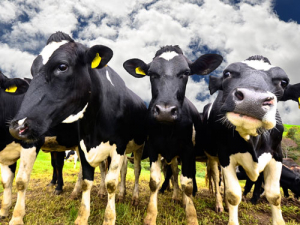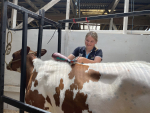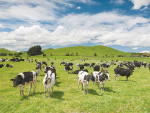The call for dairy farmers to prepare now for a future with smaller, more productive herds depends on access to superior dairy sires.
This is the message World Wide Sires will be giving farmers at the South Island Agricultural Field Days at Kirwee from March 27 to 29.
Hank Lina, World Wide Sires’ general manager for New Zealand, said “in the US and around the world, farmers are recognising that genomic sires are light years ahead of daughter-proven sires because they have been selected for the traits farmers need today and tomorrow – not yesterday.
“Demand for genomically proven bulls in the US is now greater than for daughter-proven: 70% of all semen sold in the US is genomic. This gives farmers the advantage of a level of genetic gain never before possible. The genetic superiority of today’s genomic bulls is light-years ahead of traditionally proven bulls.”
Lina said World Wide Sires “began genomically proving bulls in 2009 based on one of the largest base populations in the world comprising at least 2 million genotyped animals”.
“The size and depth of that data set provides a very high level of accuracy in genomic prediction, and that has led to the confidence we are now seeing amongst American farmers.
“The NZ experience with genomics is at odds with the rest of the world largely because this country simply doesn’t have the large data set of genotyped animals needed to generate strong reliabilities consistent with daughter performance.
“The Productivity Commission’s report, highlighting the need for the herds of the future to be smaller and more productive, reinforces that farmers need to be using sires selected for that purpose.
“Three or four years ago, when many of the NZ-bred daughter proven sires on offer to Kiwi farmers today were selected, the breeding imperative was different: we were still in a growth phase.
“A quick look at the latest dairy statistics confirms the productivity of the NZ national herd is increasing slowly: e.g. 20 years ago average kgMS/cow was 301, ten years ago it was 330kgMS and today it is ‘only’ 380kgMS.
“Contrast that with the genetics that World Wide Sires’ parent AB cooperative Select Sires has generated: upwards of 550 kgMS/cow per year. And those cows are bred to last.”
The figures speak for themselves, Lina said. Milk 414 (average NZ herd size) cows doing (the average) 381kgMS or fully feed and milk 286 cows and produce 550kgMS.
“Both scenarios deliver the same end-result, confirming that it is possible for farmers to cut back on numbers without negatively impacting on the profitability of the farm – with less cost, stress and impact on the environment.”
Lina said the breeding logic of ‘going genomic’ is one which is finding favour amongst Kiwi farmers and they are expecting continued high demand.











